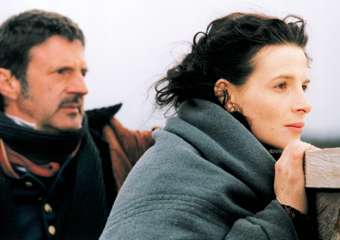
"The Widow of Saint-Pierre", a beautifully conceived, brilliantly acted film, opens with a wide shot of a single being in a lonely room. Slowly, the camera moves in, and as we get closer, it becomes all to clear that this woman is the one described in the title. Her sadness is radiating, and already piercing to the audience who has yet to know her.
The year is 1849. On the islands of Miquelon and Saint-Pierre, two drunk men commit murder. Their reason? They want to find out if the man they murdered was big or fat. The one who did the deed, Ariel Neel Aguste (Emir Kusturica) is sentenced to death, the other is given life in jail. There is one problem, however. Neel was sentenced to death by guillotine, but on Saint-Pierre there is no guillotine and no executioner. The leaders of the town do not want to look like fools, therefore the execution is put on hold until a guillotine can be found.
With this much, a mood of gripping suspense is already set up. Almost the entire film is spent waiting for the guillotine (or the "widow", as some of the townsfolk call it) to arrive, which takes months. In these months, Neel befriends the Captain Jean (Daniel Auteuil) and his wife (who is playfully called Madame La (Juliette Binoche)). He gains the sympathy of the entire town (and us). He does an incredible amount of service in Saint-Pierre and even saves a life. This makes the gradual arrival of the widow all the more ominous. Neel is sharing some great times (he even gets married), and we know that it must come to an end. All of Saint-Pierre becomes involved in a crusade to get Neel's execution cancelled, and it comes incredibly close to working. But what is so powerful about "Saint-Pierre" is the relationship between Jean and Madame La. Their love for each other is undying, but their bodies are not.
I have seen a million movies with faux romances, giving a measly "love triangle" to grab us instead of letting the characters follow their natural course. I never thought that an affair would take place in "The Widow of Saint-Pierre", and thank heavens director Patrice Leconte stayed true to the times and abandons any thoughts of sex between Madame La and Neel. Madame La loves her husband. I believe this is what the film was really about; Madame La and the captain being brought down in a whirlpool of political confusion. Both have full sympathy for Neel, but if Madame La does anything about it, she will endanger her husband.
The acting in "Saint-Pierre" flourishes. Juliette Binoche, who was charming in "Chocolat", gets to show her true talent in this film. If you have only seen her in "Chocolat", give this film a chance, for she truly gives one of the finest performances I have seen all year. Daniel Auteuil and Emil Kusturica are also perfect, both being able to evoke sympathy while staying noble.
"The Widow of Saint-Pierre" is another film that will make you loathe capital punishment (also see Lars von Trier's "Dancer in the Dark"). It is also a poignant work that is romantic without being contrived, sad without being melodramatic, and epic whilst still staying true to itself. Its the kind of film that is a rarity in the business today, one that will attach you to its characters and not allow you to think even for a minute that their final days together were wasted. This is the kind of film I wish Hollywood could produce.
|